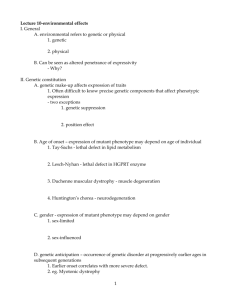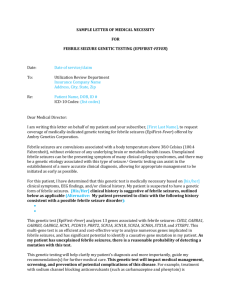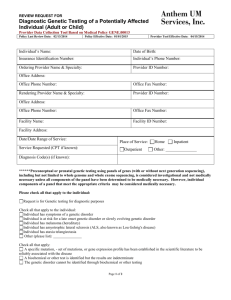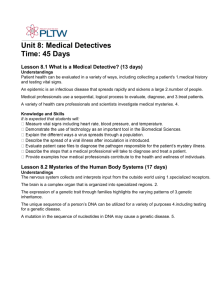Neonatal Seizures (EpiFirst-Neonate)
advertisement
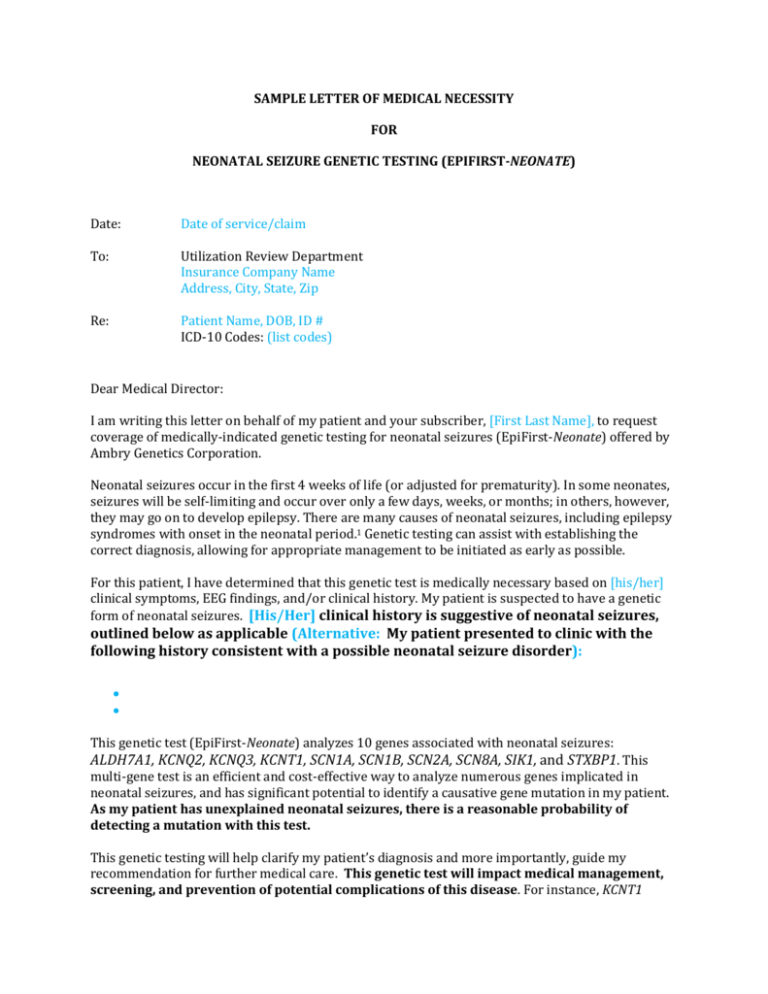
SAMPLE LETTER OF MEDICAL NECESSITY FOR NEONATAL SEIZURE GENETIC TESTING (EPIFIRST-NEONATE) Date: Date of service/claim To: Utilization Review Department Insurance Company Name Address, City, State, Zip Re: Patient Name, DOB, ID # ICD-10 Codes: (list codes) Dear Medical Director: I am writing this letter on behalf of my patient and your subscriber, [First Last Name], to request coverage of medically-indicated genetic testing for neonatal seizures (EpiFirst-Neonate) offered by Ambry Genetics Corporation. Neonatal seizures occur in the first 4 weeks of life (or adjusted for prematurity). In some neonates, seizures will be self-limiting and occur over only a few days, weeks, or months; in others, however, they may go on to develop epilepsy. There are many causes of neonatal seizures, including epilepsy syndromes with onset in the neonatal period.1 Genetic testing can assist with establishing the correct diagnosis, allowing for appropriate management to be initiated as early as possible. For this patient, I have determined that this genetic test is medically necessary based on [his/her] clinical symptoms, EEG findings, and/or clinical history. My patient is suspected to have a genetic form of neonatal seizures. [His/Her] clinical history is suggestive of neonatal seizures, outlined below as applicable (Alternative: My patient presented to clinic with the following history consistent with a possible neonatal seizure disorder): This genetic test (EpiFirst-Neonate) analyzes 10 genes associated with neonatal seizures: ALDH7A1, KCNQ2, KCNQ3, KCNT1, SCN1A, SCN1B, SCN2A, SCN8A, SIK1, and STXBP1. This multi-gene test is an efficient and cost-effective way to analyze numerous genes implicated in neonatal seizures, and has significant potential to identify a causative gene mutation in my patient. As my patient has unexplained neonatal seizures, there is a reasonable probability of detecting a mutation with this test. This genetic testing will help clarify my patient’s diagnosis and more importantly, guide my recommendation for further medical care. This genetic test will impact medical management, screening, and prevention of potential complications of this disease. For instance, KCNT1 mutations can cause epilepsy in infancy with migrating focal seizures, a severe epileptic encephalopathy with a poor outcome. Based on emerging evidence from functional studies, treatment with quinidine has been successful in some patients with KCNT1 mutations.2 Specifically for this patient, the results of the genetic test are necessary to consider in the following areas [check all that apply]: Genetic testing will lead to changes in my medical management strategies; AND/OR Genetic testing will lead to changes in diagnostic procedures such that more potentially invasive alternative procedures could be avoided, reducing unnecessary tests and cost; AND/OR Genetic testing will lead to informed decisions for other family members with similar conditions, or that may be at risk for similar conditions EpiFirst-Neonate includes full gene sequencing and deletion/duplication analysis of 10 genes (listed earlier). Due to the medical risks associated with these mutations and the available interventions, this genetic test is medically warranted. As such, I am ordering this test as medically necessary and affirm that my patient (Alternative: authorized representative, if a minor) has provided informed consent for genetic testing. A positive test result would confirm a genetic diagnosis and would ensure my patient is being managed appropriately. I am specifying Ambry Genetics Corporation because this laboratory has highly-sensitive and cost-effective testing for unexplained neonatal seizures, along with a large database of tested patients to ensure highly validated, accurate, and informative test interpretation. Please review this information and provide support for this request for coverage of diagnostic genetic testing for my patient. Coordinating and completing complex testing of this nature can take up to several months; we are requesting that the authorization be valid for at least 6 months. Thank you for your time and further consideration. If you have any questions, please do not hesitate to contact me at the numbers indicated below. Sincerely, Ordering Clinician Name (Signature Provided on Test Requisition Form) (MD/DO, Clinical Nurse Specialist, Nurse-Midwives, Nurse Practitioner, Physician Assistant, Genetic Counselor*) *Authorized clinician requirements vary by state [Clinician Address] [Clinician Phone Number] Test Details CPT codes: 81404, 81406x3, 81407, 81479x5 Laboratory: Ambry Genetics Corporation (TIN 33-0892453 / NPI 1861568784), a CAPaccredited and CLIA-certified laboratory located at 15 Argonaut, Aliso Viejo, CA 92656 References 1. Bellini G, et al. KCNQ2-Related Seizure Disorders. April 27, 2010 [Last Update: April 11, 2013]. In: Pagon RA, et al., editors. GeneReviews® [Internet]. Seattle (WA): University of Washington, Seattle; 1993-2014. 2. Mikati MA, et al. Quinidine in the treatment of KCNT1 positive epilepsies. Ann Neurol. 2015; Sep 15.




